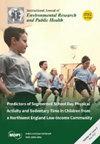社会情感学习干预对 COVID-19 中小学生社会情感能力和行为问题的影响
3区 综合性期刊
Q1 Medicine
International Journal of Environmental Research and Public Health
Pub Date : 2024-09-17
DOI:10.3390/ijerph21091223
引用次数: 0
摘要
本研究调查了在 COVID-19 大流行的背景下,一项为期一年的社会情感学习计划能否提高学生的社会情感能力,并减少学生的内化和外化问题。此外,该计划还分析了不同社会经济背景的学生(男生与女生)在社会情感能力、外化和内化问题方面受到的不同影响。该计划适用于 358 名葡萄牙三、四年级学生(51.4% 为男生,Mage = 8.56;SD = 0.82)。干预前后分别进行了自评(学生)和他评(教师)问卷调查。计算线性混合效应模型来检验干预的影响。结果表明,在社会情感学习能力(即情感知识、社交能力、同伴关系、自我管理和学习行为)以及外化(社交问题)和内化(焦虑)问题方面,干预效果显著。在攻击性方面没有发现任何影响。社会情感能力较低、外化和内化问题较多的学生从该计划中获益更多。性别对情绪知识和社会问题都有调节作用,而社会经济地位只对社会问题有调节作用。研究结果凸显了这一社会情感学习计划的有效性,尤其是对面临初步挑战的学生而言。在承认其局限性和优势的同时,还讨论了对未来研究的建议。本文章由计算机程序翻译,如有差异,请以英文原文为准。
Effects of a Social–Emotional Learning Intervention on Social–Emotional Competencies and Behavioral Problems in Elementary Students Amid COVID-19
This study investigated whether a social–emotional learning program, implemented over a one-year period, could lead to gains in social–emotional competencies and to a reduction in internalizing and externalizing problems in the context of the COVID-19 pandemic. Furthermore, the program analyzed how students (boys vs. girls) with varying levels of social–emotional competencies and externalizing and internalizing problems, and from different socioeconomic backgrounds, were differently affected. The program was applied to 358 Portuguese third- and fourth-grade students (51.4% boys, Mage = 8.56; SD = 0.82). Self-report (students) and hetero-report (teachers) questionnaires were administered before and after the intervention. Linear mixed-effects models were computed to test intervention impacts. Significant intervention gains were noted in social–emotional learning competencies, namely emotional knowledge, social competence, peer relations, self-management, and academic behavior, and in externalizing (social problems) and internalizing (anxiety) problems. No effects were found in aggressiveness. Students with lower social–emotional competencies and higher externalizing and internalizing problems at baseline profited more from the program. Gender moderated both emotional knowledge and social problems, and socioeconomic status only moderated social problems. Findings highlight the effectiveness of this social–emotional learning program, especially for students facing initial challenges. Recommendations for future research, acknowledging limitations and strengths, are discussed.
求助全文
通过发布文献求助,成功后即可免费获取论文全文。
去求助
来源期刊

International Journal of Environmental Research and Public Health
Medicine-Public Health, Environmental and Occupational Health
CiteScore
7.30
自引率
0.00%
发文量
14422
审稿时长
1 months
期刊介绍:
International Journal of Environmental Research and Public Health (IJERPH) (ISSN 1660-4601) is a peer-reviewed scientific journal that publishes original articles, critical reviews, research notes, and short communications in the interdisciplinary area of environmental health sciences and public health. It links several scientific disciplines including biology, biochemistry, biotechnology, cellular and molecular biology, chemistry, computer science, ecology, engineering, epidemiology, genetics, immunology, microbiology, oncology, pathology, pharmacology, and toxicology, in an integrated fashion, to address critical issues related to environmental quality and public health. Therefore, IJERPH focuses on the publication of scientific and technical information on the impacts of natural phenomena and anthropogenic factors on the quality of our environment, the interrelationships between environmental health and the quality of life, as well as the socio-cultural, political, economic, and legal considerations related to environmental stewardship and public health.
The 2018 IJERPH Outstanding Reviewer Award has been launched! This award acknowledge those who have generously dedicated their time to review manuscripts submitted to IJERPH. See full details at http://www.mdpi.com/journal/ijerph/awards.
 求助内容:
求助内容: 应助结果提醒方式:
应助结果提醒方式:


